On the afternoon of July 28, 2022, the 1st CAMPUS Asia+ BESETOSING Intellectual Dialogue and the 5th CAMPUS Asia BESETO Intellectual Dialogue) were successfully held online with the theme of the Future of Globalization. Four distinguished guests attended the event and made wonderful speeches, including Tang Shiqi, Dean of the School of International Studies, Peking University; Keisuke Iida, Dean of the Graduate School of Public Policy, The University of Tokyo; Park Tae Gyun, Dean of the Graduate School of International Studies, Seoul National University, and Danny Quah, Dean of the Lee Kuan Yew School of Public Policy, National University of Singapore. This event was presided over by Dong Zhaohua, Associate Dean of the School of International Studies, Peking University, and opened to students and alumsfrom four universities to watch online. Over 60 scholars and students attended this event.
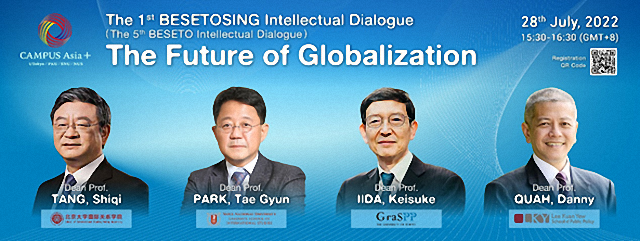
Keisuke Iida pointed out that, despite a steady march toward economic globalization since World War II, significant events worldwide have cast a spell of uncertainty on globalization. The escalating China-US trade war since 2018, the outbreak of the COVID-19 pandemic since early 2020, and the Russia-Ukraine conflict that burst out in early 2022 have clouded global development, mirrored by the tension arising from China-US economic interdependence,restriction on cross-border movement of goods and personnel, global food crisis and soaring energy price. Although the impact of these circumstances might not last long, it requires a timely response and joint efforts to recover the process of globalization.
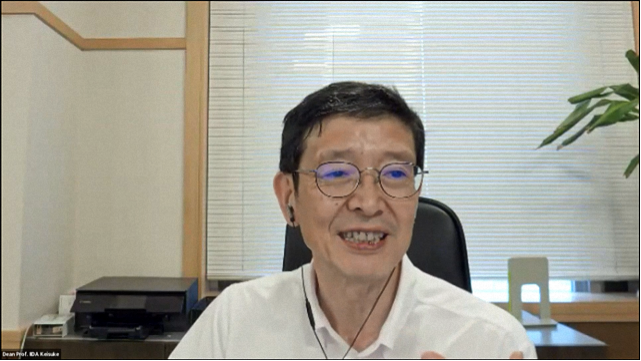
(Speech by Keisuke Iida)
Park Tae Gyun sharedhis observations on the CAMPUS Asia Program. He said that COVID-19 prevention and control policies varying from one country to another turned out to restrict international exchanges and the movement of international students. Despite the travel restriction, Seoul National University has tried its best to provide timely assistance for students under the program to study on its campus. He suggested that the CAMPUS Asia Program prepare for a future pandemic and other international public emergencies and give international students more options on courses tocreate new growth points for the program.
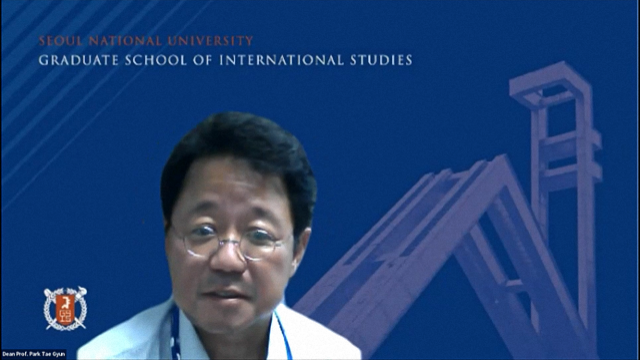
(Speech by Park Tae Gyun)
Danny Quah focused on the internal momentum of globalization. He believed economic competition and technological advances were two major factors driving globalization. But these two were not enough to fuel it anymore as more barriers stood in the way. Therefore, it was imperative to raise public concern and make its core benefit widely known, enabling the supply of goods anywhere to anyone in need with increasingly lower costs. Meanwhile, all countries should work together to address such issues as techno-nationalism, geopolitics, and identity politics that impede globalization.
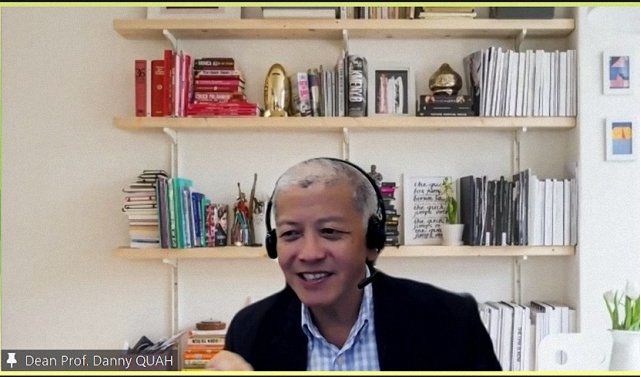
(Speech by Danny Quah)
Tang Shiqi shed some light on the different dimensions of globalization, uneven development, and the global redistribution system. He believed that globalization is a process covering multiple elements such as science and technology, information, economy, culture, outlook on value, and paradigm. One of the two waves of globalization in history was in tune with British hegemonism, while the other was accompanied by neoliberalism. Unfortunately, the uneven development of globalization, in terms of speed and extent, undermined domestic and international liberalization that should have underpinned the second wave of globalization. He also said that globalization was, in nature, an exchange and distribution mechanism of wealth in the global context. But the lack of a supporting redistribution system to serve the purpose exacerbated the uneven development of countries and resulted in a shortage of global public goods. Tang held the view that globalization in certain fields may present a slow-down trend, but that in science and technology, as well as in culture, would go unabated, as, in these fields, fundamental technologies have already been in place to sustain globalization and generate new economic possibilities. In the long run, a new wave of liberalization will come. But to realize sustainable globalization with strong impetus, we must put in place a global redistribution system that reflects justice, corrects unfairness, and supplies public goods in a certain proportion.
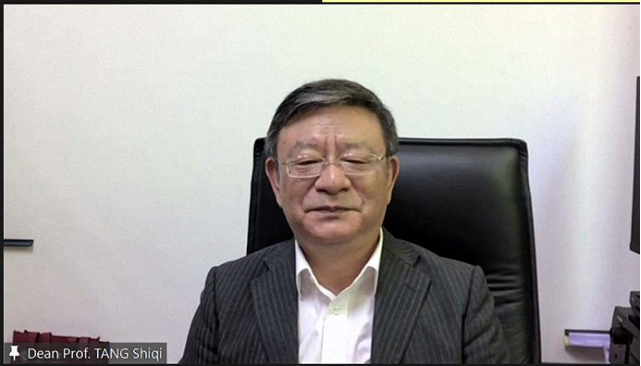
(Speech by Tang Shiqi)
In the discussion section, Tang Shiqi and Danny Quah voiced their opinions on the global redistribution system. They agreed that a “coordinator” is needed to achieve a fair distribution worldwide, besides the “invisible hand.” Considering the anarchical situation in the international community and the difficulty of building a united government, all countries should enhance political mutual trust, solve problems with enhanced coordination and collaboration, and give up the idea of isolation and being single-handed. The audience also shared their thoughts and raised questions related to relative gains and China-US cooperation and conflict from the realism perspective, to which speakers gave excellent answers. The meeting won wide recognition.
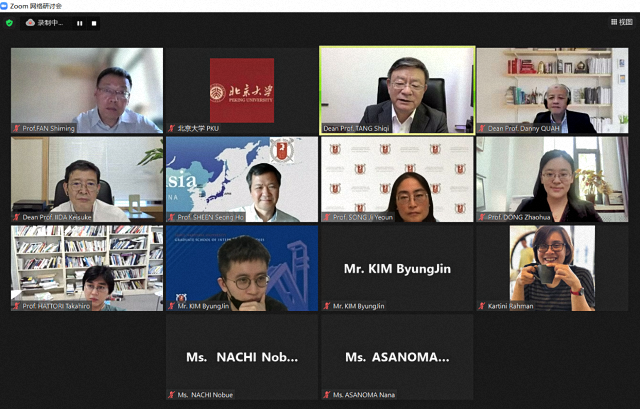
On the afternoon of July 28, the 15th BESETOSING CAMPUS Asia Joint Academic Board Meeting was held online. Many guests attended the meeting, including Dong Zhaohua, Associate Dean of the School of International Studies; Zhang Jingxue, representative of the Office of International Programs, School of International Studies, Peking University; Professor Sheen Seong-Ho, Director of the BESETOSING CAMPUS Asia Program, Kim Byungjin, Program Supervisor from the Graduate School of International Studies, Seoul National University; Takahiro Hattori, Professor at the Graduate School of Public Policy; Nobue Nachi, Senior Manager of the BESETOSING CAMPUS Asia Program, and Nana Asanoma, contact person of the Program, The University of Tokyo; and Kartini Binte Abdul Rahman, Supervisor of the BESETOSING CAMPUS Asia Program, National University of Singapore. The meeting was presided over by Dong Zhaohua.
The meeting reviewed the travel of international students in recent months, their field investigations, and joint courses, among other issues. Given that universities from ASEAN countries were included in the 3rd CAMPUS Asia Program, a new cooperation model for universities under the program to exchange students was proposed and followed by a fruitful discussion.
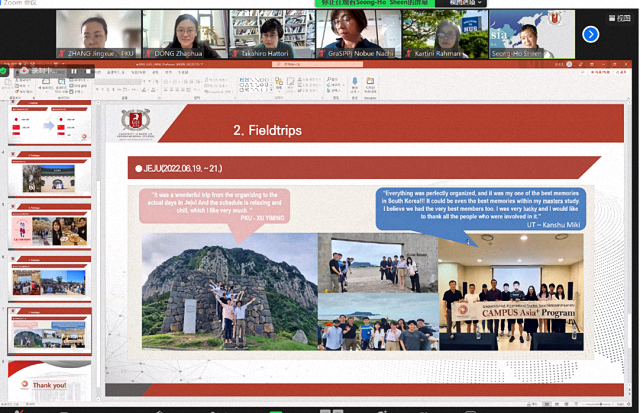
The BESETO CAMPUS Asia is a flagship and premium program of international exchanges among Peking University, The University of Tokyo, and Seoul National University. Since its implementation in 2011, the project has attracted hundreds of students from China, Japan, and the Republic of Korea, enabling youngsters and scholars from these three countries to learn from each other. With the involvement of the National University of Singapore in 2021, BESETO was renamed BESETOSING.
Authored by: Wu Zihan; Luo Tianling
Photographed by: Wu Zihan; Zhang Jingxue
Reviewed by: Dong Zhaohua; Zhang Jingxue
